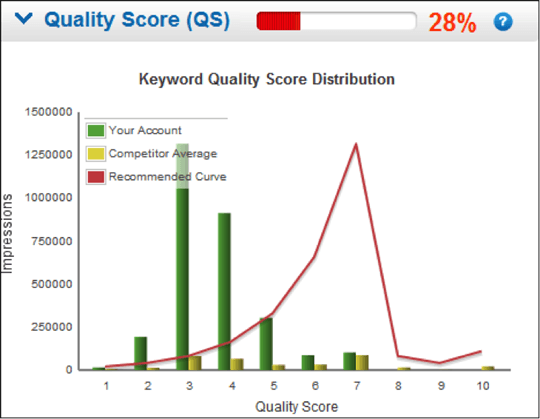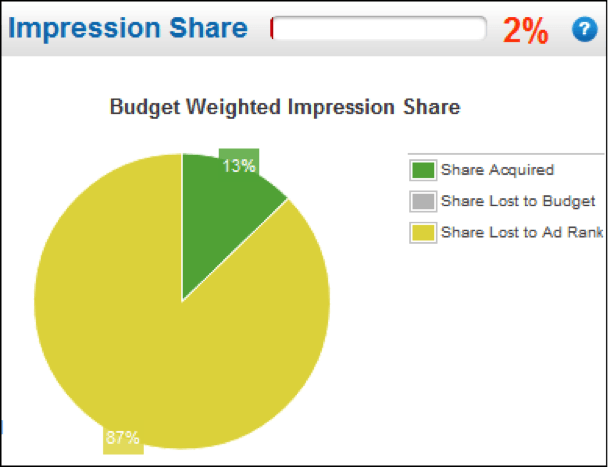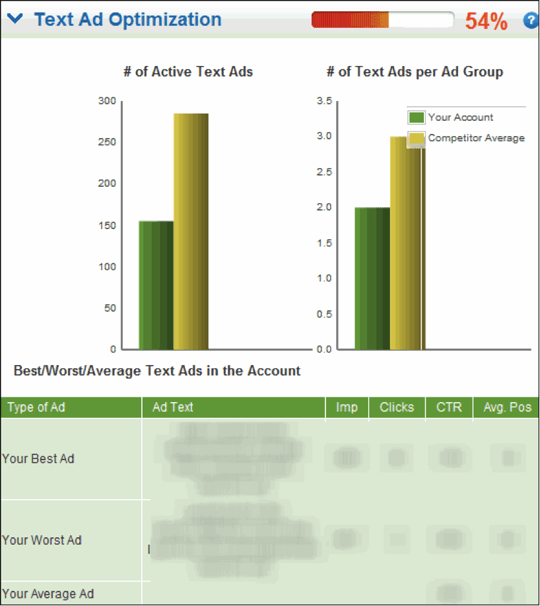There are a lot of great tools for performing SEO audits, and some good posts on the topic of performing PPC audits “by hand”, but there seem to be far fewer similar tools for paid search campaigns. In this post I’ll introduce you to a pair of tool sets that can help you get a quick idea of problem areas in a pay-per click campaign. I’ll also offer a brief cautionary note on over-reliance on PPC auditing tools.
WordStream’s Google AdWords Performance Grader
My friends at WordStream just released Google AdWords Performance Grader as a slick new tool that looks at a number of factors in your Google AdWords account, including:
- Quality Score
- Usage of negative keywords
- Impression share
- Click-through rate
- Long-tail keyword optimization
- Account activity
- Ad text optimization
- Landing page optimization
You can check out a sample report here, but some of the cool things the report looks at are:
Impression-Weighted Average Quality Score – When I was at WordStream we launched a pretty handy calculator in the Quality Score Toolkit that looked beyond higher-level Quality Score metrics to give you a feel for how your Quality Scores look based on the actual impressions received at different scores. The Grader looks at this metric as well and gives you a quick snap shot of whether your account may have some Quality Score issues.

Budget Weighted Impression Share – This is another nice metric in that it adds a layer of context (impressions) to the standard impression share metric.

Text Ad Optimization – This is a great one in that it gives you some insight into how frequently you’re optimizing ad text in relation to other campaigns in a similar spend range.

General PPC Best Practices – Here you get a quick thumbs up/ thumbs down check into which best practices you’re actually adhering to. This section focuses on:
- Network Targeting – Are your campaign settings customized for their specific network (Search vs. Display)?
- Geo Targeting – Are your campaigns focused on your most profitable markets?
- Language Targeting – Are you making use of language restrictions for better audience targeting?
- Conversion Tracking – Are you keeping track of which keywords and ads drive profitable actions?
- Multiple Text Ads Running – Are you running multiple ads in each ad group to ensure strong targeting?
- Modified Broad Match Type – Are you making use of match types that give you more control?
- Negative Keywords – Are you using negative keywords to reduce wasteful spending and irrelevant clicks?
- Use of Adwords Ad Extensions – Are you using Ad Extensions to provide additional links and improve click-through rates?
Each of these evaluations are handy check-points to determine the relative health of various aspects of your campaigns. One of the cool things here too is that the grades aren’t given on an absolute basis, but rather “on a curve” relative to other accounts in your spend category so that your SMB lead gen account isn’t expected to write as many text ads as the folks spending millions a month on AdWords.
Certified Knowledge’s Report Analyzer Tool
One of the things WordStream’s report doesn’t focus on in great detail is specific conversion data. This is where Certified Knowledge’s Report Analyzer (one of the premium PPC tools offered inside the Certified Knowledge community).
This tool looks at any of the following reports:
- Placement/Keyword Performance
- Ad Performance
- URL Performance
- Ad Group Performance
- Campaign Performance
- Account Performance
- Demographic Performance
- Geographic Performance
- Search Query Performance
- Placement Performance
And focuses the output on:
- What is profitable
- What is unprofitable
- What keywords are below the first page bid
- What keywords need to be watched closely as they can start to become unprofitable
- What keyword cannot be on the first page profitably (you need to work on these first)
- Suggested bids based upon your ROI
These insights allow you to get a quick glimpse at the areas of your campaigns that are actually making money, areas that aren’t, and which have potential problem areas.
The Challenge with PPC Auditing Tools
If you combined the two tools above, you’d have a really nice look at a lot of the “inputs” to creating a sound account (from the WordStream report). You’d also have a nice feel for how that’s playing out on the back end via the Certified Knowledge report, but you’d certainly miss some things.
These PPC auditing tools are great but should be used as quick diagnostic tools, and they definitely aren’t a replacement for an in-depth, deep dive into a paid search account. And neither Brad Geddes nor the folks at WordStream would disagree – Brad’s community offers a ton of interaction as well as a volume of modules to help people – the actual practitioners – better understand paid search, and WordStream offers both a more robust tool-set for optimizing accounts and an audit by a real-live account exec.
The moral of the story is leverage these types of tools (whether they be for general account maintenance or for specific functions such as negative keyword analysis) to get quick and valuable insights into large volumes of data. However, they’re not a substitute for in-depth campaign management by systems that add on-going value and campaign managers who can generate valuable insights about your business and the actual health of your paid search campaigns.





![AI Overviews: We Reverse-Engineered Them So You Don't Have To [+ What You Need To Do Next]](https://www.searchenginejournal.com/wp-content/uploads/2025/04/sidebar1x-455.png)